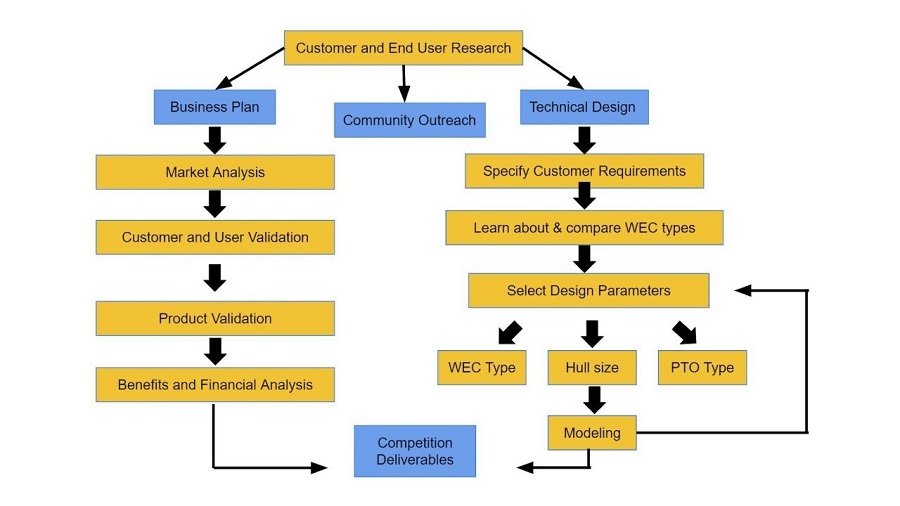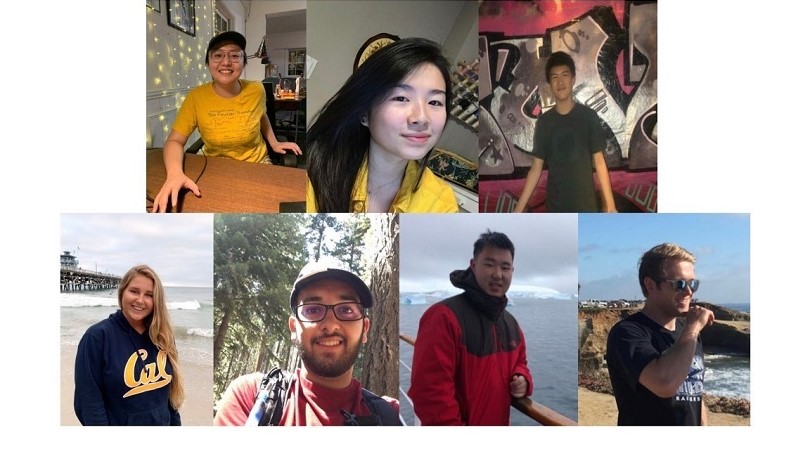U.S. Department of Energy Marine Energy Collegiate Competition (MECC)
Team Name: Golden Wave

University of California, Berkeley, Berkeley, California
Team deliverables
- Poster: Wave Energy for Microgrids and Isolated Communities
- Report: Wave-Powered Microgrid System for Isolated Communities
- Presentation: Wave Energy for Microgrids and Isolated Communities
- Recording of virtual team presentation
Why this competition?
Studying at a university next to the Pacific Ocean, we are constantly fascinated by the power of waves and tides, and we see so much potential in the vast and furious ocean. Members of our team wish to learn about how marine energy, as a sustainable solution to the ongoing environmental crisis, can benefit our planet, and we enjoy developing ideas in this field with like-minded people. As participants in the U.S. Department of Energy Marine Energy Collegiate Competition (MECC), we strive to learn about the different ways to apply an engineering process to marine power and the challenges of engineering in marine environments.
Project description, including application in the blue economy
Many isolated coastal communities rely on diesel fuel flown in from hundreds of miles away, significantly increasing the cost of electricity and making equitable access to this important commodity a challenge. Aging infrastructure and mechanical breakdowns exacerbate the challenges by affecting service reliability. Furthermore, coastal regions impacted by natural disasters often depend on emergency grids for rapid recovery. Our goal is to design a wave energy converter that provides power to isolated community microgrids, thereby providing a practical, economically superior, and clean way for these communities to access electricity.
Transitioning to a locally sourced renewable energy system helps coastal communities reduce pollution and create economic opportunities, increasing local capacity and knowledge.
Game plan
Our game plan to develop a business plan, community outreach strategy, and technical design for a wave energy converter starts with customer and end-user research. We are currently mapping out the countries and regions that have isolated communities and learning about their power requirements and system operators.
We plan to leverage our members’ business and consulting experience, as well as reach out to the Berkeley Energy and Resources Collaboration and Calwave, a local wave energy company, to write a comprehensive business plan for the energy generation field. In addition, we will work with the Energy Institute at Berkeley Haas School of Business to build our brand and develop our sustainability-oriented pitch.
To communicate to the general public and the local community about marine energy, the MECC, and our project, we will conduct outreach, both through campus communication channels and at Bay Area schools. One such opportunity is teaching a class on wave energy on March 13 through Berkeley SPLASH —a one-day program where UC Berkeley students teach high school classes on conventional and unconventional subjects. The team also hopes to gain access to campus to build mini wave and tidal tanks for use in future classroom demonstrations. We will also publish an article highlighting our 2020 MECC Mobile Wave-Powered AUV Charging Station submission, as well as this year’s wave energy converter project, in the Berkeley Science Review, a campus magazine designed to educate the public about science topics.
To inform the technical development of our system, we will first consult with isolated communities around the world to better understand their electricity needs and the challenges their local environments pose. We will also consult with groups such as the American Red Cross about the electricity requirements of natural disaster sites to understand how they might benefit from a system like ours. Other issues we will factor into our design include cost, survival strategy, longevity, maintenance, and transportation. Better understanding the requirements of potential customers will let us compare and contrast the unique designs of different wave energy devices. From there, we will use programs such as WEC-Sim to model our design’s effectiveness in meeting the required power outputs for isolated communities. Finally, we will consult with isolated communities to identify and address areas we might have overlooked.
Team strengths
We are a diverse team with varying backgrounds, from mechanical engineering to computer science to physics to business. Everyone joins the team with a passion for marine energy. Half our team competed in the 2020 competition, whereas half is new to marine energy, so we have a good balance.
The 2021 University of California Berkeley MECC team. Photo credit: University of California Berkeley MECC team
Team hurdles
The ongoing pandemic restrictions prevent us from building physical prototypes for testing. Without access to the lab to use the wave tank, we will not be able to iterate our design with data-driven modifications based on in-lab experiments. Although various disciplines are represented on our team, most of our members are in the engineering and science fields. Lacking major representation from the business, economics, and other fields, we will try to recruit new team members who come from these backgrounds and will need learn a good deal about these topics to formulate a strong business plan.
Competition objectives
Our team endeavors to:
- Explore more about ocean engineering
- Solve real-world problems with the engineering skills we have gained so far
- Create a cost-effective method that can be effectively applied to the market
- Contribute to the current research in this field
- Learn more about modeling for wave energy converters
- Meet more people who are interested in ocean energy
- Present a viable technical design that is practical for isolated communities in need of affordable, reliable, and clean power.
Social media accounts
Facebook: UC Berkeley Marine Energy Collegiate Competition Team
Instagram: @ucberkeleygoldenwave
This portal is sponsored by the U.S. Department of Energy, Office of Energy Efficiency and Renewable Energy (EERE), Water Power Technologies Office (WPTO) under Contract Number DE- AC36-08GO28308 with the National Renewable Energy Laboratory, Contract Number DE-AC05-76RL01830 with the Pacific Northwest National Laboratory, and Contract Number DE-NA0003525 with Sandia National Laboratories, as part of the MHK Data Communities project. The United States Government retains, and the publisher, by accepting the article for publication, acknowledges that the United States Government retains a non-exclusive, paid-up, irrevocable, world-wide license to publish or reproduce the published form of this manuscript, or allow others to do so, for United States Government purposes.

